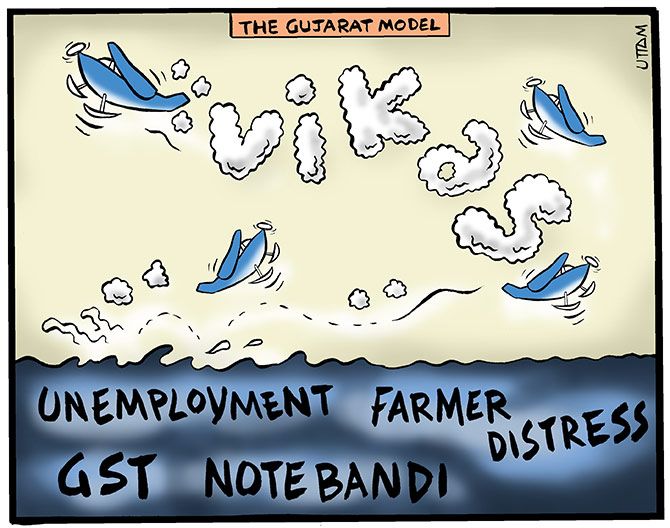'The Gujarat model was never an economic model; it was essentially a governance model.'
'Mr Modi identified what would help him win votes and got it done, like 24x7 power in three phases, better roads, more water, etc.'
'Good economic governance at state level is quite different from good governance at national level,' points out T C A Srinivasa-Raghavan.

Illustration: Uttam Ghosh/Rediff.com
As befits an ageing journalist, I usually have an explanation for everything. But one aspect of the Modi government has completely flummoxed me.
This is that while it conducts its politics with extreme cleverness, in economic policy it shows extraordinary clumsiness.
We all know about demonetisation and its consequences. No one believes any longer that it achieved the objectives set out by the prime minister when he announced it.
We also know about the utterly ham-handed way in which GST has been implemented. It's amazing how this fiasco was allowed to happen by the finance ministry.
Its agriculture policy, or that bit for which the Centre is responsible, namely, the minimum support prices, has been not just economically inept, but also politically so.
Farmers are seriously worse off now. They will have their revenge when the election comes.
Its policy for industry, such as it is, has not yielded any results so far.
Land acquisition remains next to impossible.
Investment remains sluggish.
And the less said about exports the better.
Industrialists who were so expectant in 2014 are a very disappointed lot now.
Narendra D Modi started off with a huge emphasis on the supply side, but seems to have either forgotten about it or given up on it.
The government has also been unable to deliver on the promises of employment in the formal sector.
It is only now that it is changing its messaging and talking about creating work.
Its fiscal policy, on the high road to rectitude till now, is all set to take the low road.
This can be attributed both to GST's adverse impact on revenue and the forthcoming general election in 2019.
As to monetary policy, it has been conservative in the extreme, aimed at keeping inflation lower than is necessary.
This has been done in the belief that demand management is vital even when consumption is so slack.
All this is in sharp contrast to its political management, which has been outstanding and whose only aim is winning assembly elections, and, if not, make sure that the BJP is in the government somehow.
And won it has, all across India. It now has its governments in as many as 14 states, including Jammu and Kashmir, where it is following what game theorists call a mixed strategy with good results so far.
The BJP is slowly but surely expanding its footprint in the South, having already done so in the East.
In both regions electoral success is some distance away but no one can dispute its expanding influence.
Its methods can be questioned, but the results are there for all to see.
From what one gathers, areas under Maoist control, once alarmingly large, now seem to be well in control.
Touch wood, the sort of carnage one saw under the UPA has now become rare.
Even its foreign policy, a little bumbling and I K Gujralish to begin with, has stabilised.
China and Pakistan are its only real problems now, but then, they are a problem for everyone.
On education, where its writ runs large, it is not doing any worse than the Congress or the UPA. But as all large countries have discovered, the problem, not being a clearly defined one, is not a solvable one, either.
Health is the opposite: It is very clearly defined but remains a huge problem. However, it isn't yet a political issue in the same way as education is, and, despite AAP's effort to make it one, it remains marginal to our politics.
The one clear failure, comparable to its agricultural policy, is in social policy.
Making India caste-less for politics has been compensated for by making it highly communal.
Even otherwise self-confident Hindus now bleat about the Muslims instead of ignoring them socially as they have done for centuries.
Whataboutery has become the order of the day.
For the last two years I have been saying that the Gujarat model was never an economic model; it was essentially a governance model.
Mr Modi identified what would help him win votes and got it done, like 24X7 power in three phases, better roads, more water, etc.
But one of the key features of good democracies is that the head of the national government has less freedom than the chief minister of a state.
Good economic governance at state level is quite different from good governance at national level.
The first requires good bureaucrats; the second good businessmen.
And alas, bar a few exceptions, both are missing.











